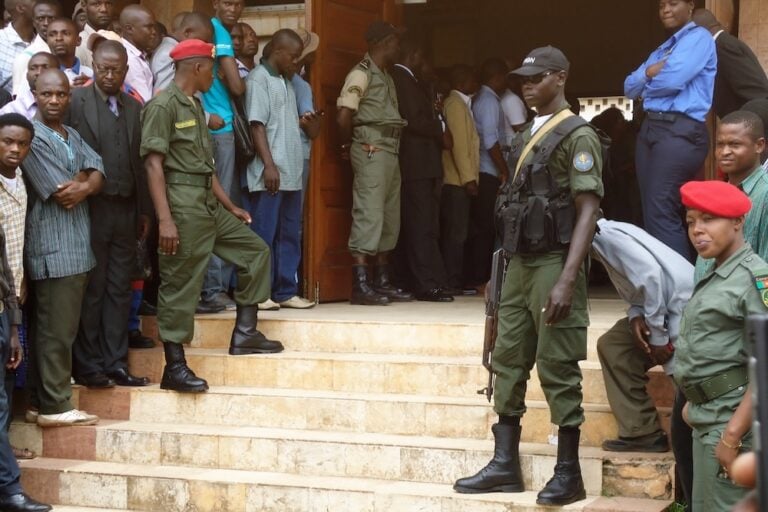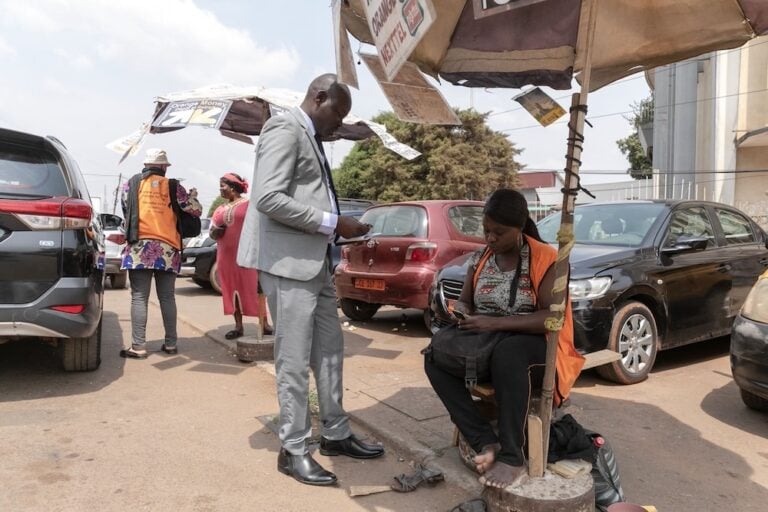"Detaining journalists for defamation violates not only their personal rights but also freedom of information in general, because it leads to self-censorship. We urge the authorities to free Nsigué, Ndiomo and Nicodemus without further delay."
Reporters Without Borders condemns the muzzling of the press in Cameroon, where three journalists are currently held on defamation charges, and calls on the government to decriminalize media offences.
The latest to be detained is Guy Nsigué, a sports reporter for the Mboafootball.com website and Radio Sport Info, who was arrested on 21 October by men from the defence ministry, which is also the headquarters of Cameroon’s Gendarmerie.
Zacharie Ndiomo, the editor of the bimonthly Le Zénith, who has been held since 13 October, was transferred on 21 October to Yaoundé’s Kondengui prison after appearing before a prosecutor. Amungwa Tanyi Nicodemus, the editor of the weekly The Monitor, has been in a prison in the northwestern city of Bamenda since 29 March.
“These three cases highlight the contradictions of a government that portrays itself as democratic while imprisoning the Fourth Estate,” said Cléa Kahn-Sriber, the head of the Reporters Without Borders Africa desk.
“Detaining journalists for defamation violates not only their personal rights but also freedom of information in general, because it leads to self-censorship. We urge the authorities to free Nsigué, Ndiomo and Nicodemus without further delay.”
Arrested outside the defence ministry after being lured there by a source, Nsigué is currently being held by the gendarmerie for an article accusing Joseph Owona, the head of the Cameroonian Football Federation’s “normalization committee,” of embezzlement.
Ndiomo was arrested as a result of a libel suit by finance ministry chief of staff Urbain Ebang Mve over an article in Le Zénith‘s latest issue claiming that Mve was about to be jailed for illicit enrichment. Ndiomo’s wife says she has not been allowed to visit him or give him his medicine since his transfer to Kodengui prison.
Nicodemus was sentenced to four months in prison and 10 million CFA francs (15,000 euros) in damages on 10 March over a series of article in The Monitor about alleged corrupt practices at the Cameroon Co-operative Credit Union League. He is still detained because he cannot afford to pay the damages, which exceed the limit set by the penal code.
These arrests and Nicodemus’ conviction all violate Cameroon’s laws. Under article 305 of the penal code, the maximum penalty for defamation is six months in prison and damages of 2 million CFA francs (3,000 euros).
Furthermore, under article 218 of the code of criminal procedure, defendants who have a known address can be placed in pre-trial detention only if they are charged with a serious crime.
Ironically, Cameroon is to host a seminar on the decriminalization of media offences that is being organized in Yaoundé on 29-30 October by the Central African Union of Media and Communications Syndicates and Professionals (USYPAC).
Cameroon is ranked 131st out of 180 countries in the 2014 Reporters Without Borders press freedom Index.


